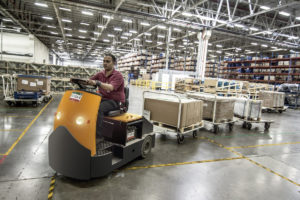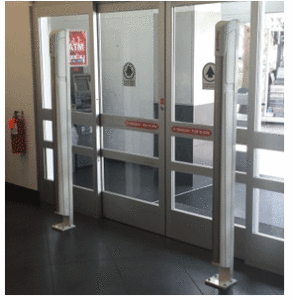 Many small and big chain businesses across the country are fed up with the amount they lose due to shoplifting and employee theft. The solutions are seemingly unavailable for these businesses and they are teaming up with local police departments to address this issue.
Many small and big chain businesses across the country are fed up with the amount they lose due to shoplifting and employee theft. The solutions are seemingly unavailable for these businesses and they are teaming up with local police departments to address this issue.
The Chico Police Department, The Chico Chamber of commerce and the Chico Business Association are teaming up in an effort to prevent shoplifting in their community. This is not the only joint effort, many other states’ police departments and communities are getting together to form a coalition to find a solution to shoplifting.
Shoplifting puts an additional strain on these businesses that in some cases are already having difficulty staying afloat and the losses incurred due to this crime make it an impossible business to sustain.
One the many ways they lose to shoplifting is to organized retail theft that involves many individuals and can cost a store thousands of dollars in a single day. Home Improvements stores targeted by individuals can damage the bottom line of these stores even though they are big retail chains that can offset the cost due to shoplifting better than the small business owner.
In some states, theft legislation has put many business owners scratching their heads. The losses they incurred due to shoplifting, they see as a direct consequence to the legislation government officials passed in their states. Preventive measures are not enough, youth programs to prevent shoplifting and violent crimes are not enough for these businesses because they do not see it happening soon enough for the well being of their stores.
What are some other alternatives to prevent shoplifting?
- Training – Trained personnel can make a big difference in your store. Recent reports in the UK have shown a dramatic increase in violent incidents from the previous year due to shoplifting. The difference between a trained employee and one that is not can be the difference between life and death
- Shoplifting prevention systems – If you do not have one and rely solely on your employees, the losses your store is suffering may be staggering. A shoplifting prevention system is a necessity for a retail business, and the amount invested in such system may be the best investment you can make for the success of your store.
- Software that works together with the loss prevention system and the trained personnel in your store are pivotal to the success of your retail business. It is a process that needs all the parts to work together to be successful and to achieve its purpose.
Shoplifting is a crime that affects society in general, and the prevention of such crime seems to be the only alternative retail businesses have. Prevention includes training your personnel, investing in a loss prevention system and software that can help you mitigate the losses due to this crime. Those three preventive measures cannot work if your employees are not engaged and are not willing to work with you in the prevention of this crime. Happiness in the workplace is important but if you are dealing with disgruntled employees, preventing shoplifting may be very hard to achieve. Talk to your employees and find out if you need to address that issue first and foremost.
 Because like alcohol abuse, both legal and illegal drug use, affects your bottom line. This issue
Because like alcohol abuse, both legal and illegal drug use, affects your bottom line. This issue  I recently read an article entitled “How to spot a liar in your inbox” by Vanessa Van Edwards. The article discussed the nuances of how to tell if someone is lying to you in an email. The writer made some interesting observations on the lack of personal pronouns in the body of an email, inconsistency in tense usage and vague language. It dawned on me that often this is the same thing supervisors handle on a regular basis with employees. Think back to a phone call you have taken from an employee calling out of work. Often the conversation goes something like this, “I don’t feel well, I think I am going to have to call out today.” The employee is using language that does not make sense. They “think” they have to call out. Either they do or they don’t have to call out, the decision is theirs to make. Saying “I think” sounds more like asking permission to call out than making a decision of their own. Avoiding responsibility is one way an employee may try to lie without feeling guilty about it.
I recently read an article entitled “How to spot a liar in your inbox” by Vanessa Van Edwards. The article discussed the nuances of how to tell if someone is lying to you in an email. The writer made some interesting observations on the lack of personal pronouns in the body of an email, inconsistency in tense usage and vague language. It dawned on me that often this is the same thing supervisors handle on a regular basis with employees. Think back to a phone call you have taken from an employee calling out of work. Often the conversation goes something like this, “I don’t feel well, I think I am going to have to call out today.” The employee is using language that does not make sense. They “think” they have to call out. Either they do or they don’t have to call out, the decision is theirs to make. Saying “I think” sounds more like asking permission to call out than making a decision of their own. Avoiding responsibility is one way an employee may try to lie without feeling guilty about it.
 As managers and supervisors, we are all guilty at some point of assuming our employees will know what we are wanting from them when we make a request or assign a project. It may be something as simple as asking someone to empty a trash canister or as complicated as resetting a plan-o-gram. In our minds, the requested task may only require common sense but to the employee, it may be something totally different. Take the trash can example, you may ask an employee to empty it and assumed they would empty it into a compactor and place a new trash can liner inside. The employee may only hear that you want them to take the bag out and place the trash beside the compactor. They don’t hear you tell them to put a new liner inside the canister when they are done because you never said it. It seems like it should only be common sense but it isn’t necessarily the case. The same problem exists for every aspect of a job. Sometimes those of us in management positions make unfair assumptions and then get angry when our team members don’t do what we expected them to do.
As managers and supervisors, we are all guilty at some point of assuming our employees will know what we are wanting from them when we make a request or assign a project. It may be something as simple as asking someone to empty a trash canister or as complicated as resetting a plan-o-gram. In our minds, the requested task may only require common sense but to the employee, it may be something totally different. Take the trash can example, you may ask an employee to empty it and assumed they would empty it into a compactor and place a new trash can liner inside. The employee may only hear that you want them to take the bag out and place the trash beside the compactor. They don’t hear you tell them to put a new liner inside the canister when they are done because you never said it. It seems like it should only be common sense but it isn’t necessarily the case. The same problem exists for every aspect of a job. Sometimes those of us in management positions make unfair assumptions and then get angry when our team members don’t do what we expected them to do. I actually like and believe in all three of these things. When it comes to drugs they have to be the legal kind. All of us have seen the destruction that illegally used drugs cause. In a business environment, illegal drug use by an employee not only has an impact on their work performance but creates serious customer and legal issues for employers. An employee that is under the influence of any substance that influences their ability to do their job correctly or safely, will cause customers to question who they are doing business with.
I actually like and believe in all three of these things. When it comes to drugs they have to be the legal kind. All of us have seen the destruction that illegally used drugs cause. In a business environment, illegal drug use by an employee not only has an impact on their work performance but creates serious customer and legal issues for employers. An employee that is under the influence of any substance that influences their ability to do their job correctly or safely, will cause customers to question who they are doing business with. Hopefully, your store is one of those places where employees look forward to coming to work. You know what I’m talking about it’s that environment where everyone is happy to be there. Employees know they are there to get a job done and take pride in the service they offer to the customers. It’s the type of job where people may have an off day but their co-workers are supportive and help pick them up. It happens to all of us. These jobs have a manager who interacts with the employees and takes a real interest in each of them. The boss may take time to say hello and greet everyone. They know their employees by name and may even know their families. Unfortunately, not every workplace has such a camaraderie amongst the team members. There is any number of reasons this can happen but a major contributor to an unhappy workplace can be the hiring of an employee with a poor attitude.
Hopefully, your store is one of those places where employees look forward to coming to work. You know what I’m talking about it’s that environment where everyone is happy to be there. Employees know they are there to get a job done and take pride in the service they offer to the customers. It’s the type of job where people may have an off day but their co-workers are supportive and help pick them up. It happens to all of us. These jobs have a manager who interacts with the employees and takes a real interest in each of them. The boss may take time to say hello and greet everyone. They know their employees by name and may even know their families. Unfortunately, not every workplace has such a camaraderie amongst the team members. There is any number of reasons this can happen but a major contributor to an unhappy workplace can be the hiring of an employee with a poor attitude. C
C

 With darker daylight hours comes the need for more coffee, the use of lights earlier and a plan to keep crime away from your store or business. Have you considered that one of the following types of crime could affect you?
With darker daylight hours comes the need for more coffee, the use of lights earlier and a plan to keep crime away from your store or business. Have you considered that one of the following types of crime could affect you?
